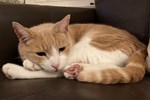New Pet Plan Charitable Trust award
Dr Rebecca Geddes has been awarded a Pet Plan Charitable Trust Pump Priming Grant to research “Is upper urinary tract stone formation in cats caused by disrupted calcium-phosphate metabolism?”
Kidney stones are a common problem in many species, including humans and cats. We see on average one cat a week at the Queen Mother Hospital for Animals with kidney stones that are causing an obstruction and preventing urine passing into the bladder as normal.
This is a painful and potentially fatal condition and frequently requires expensive surgery to relieve the obstruction. Despite surgery, many cats are left with chronic kidney disease, which impacts their quality of life and contributes to morbidity and mortality. The majority (98%) of these stones are comprised of calcium oxalate, and this is also the most common kidney stone seen in humans.

The cause of kidney stone formation is poorly understood in both humans and cats, but multiple factors are thought to be involved, including diet, body weight and genetics. Studies to help identify cats at risk of this problem and possible treatment targets to help reduce kidney stone formation are sort after.
This study aims to improve understanding of why some cats form kidney stones by exploring changes in calcium and phosphate and their regulatory hormones in blood and urine samples. Differences between stone-formers and cats that don’t form kidney stones will be used to identify future “at risk” cats and may provide possible targets for therapies that can be used to prevent stones from forming in the first place or to manage these patients without surgery.
This study will therefore improve our knowledge of the mechanisms that contribute to kidney stone development and improve our ability to diagnose and treat this condition, with the ultimate goal of improving the quality of life and welfare of these patients. This will help to reduce the devastating impact this condition has on both cats and their owners.

You may also be interested in:
-
New research from the RVC predicts the future life expectancy for companion cats
New research from the Royal Veterinary College (RVC), in collaboration with researchers from the …

